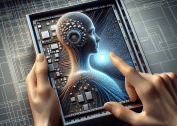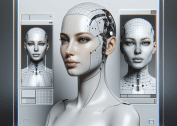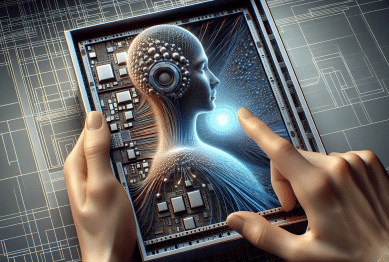Quantum computing is transforming technology with its potential to solve complex problems once thought impossible for traditional computers. This guide explores how quantum computers work, their future impact, practical uses, and ethical questions — all while connecting quantum breakthroughs to our day-to-day lives.
Understanding Quantum Computing Basics
Quantum computing marks a significant leap from classical computing. Unlike traditional computers, which process information using bits set to 0 or 1, quantum computers harness quantum bits (qubits). These qubits can exist in multiple states simultaneously, a property known as superposition. This change offers the ability to solve complex computational problems far quicker than ever before. People interested in emerging technologies, artificial intelligence development, and cryptography advancements are increasingly paying attention to quantum’s unique strengths.
Entanglement is another quantum property at the heart of this technology. It means two or more qubits can be interconnected so that the state of one immediately affects the other, no matter the distance. This phenomenon, mysterious as it sounds, allows for particularly powerful ways to process and manipulate information. Imagine a network where data leaps between points instantaneously — it’s a cornerstone of quantum advantage in security and data processing.
However, achieving reliable quantum computation remains a challenge. Qubits are sensitive to their environment, and even the slightest disturbance can cause errors, a problem known as decoherence. Researchers are creating robust quantum error correction techniques and developing new qubit hardware to overcome these issues. The race to a fully functional quantum computer is spurring innovation in areas like superconducting circuits and photonic qubits — technologies that could soon change how we think about information itself.
Quantum Computing Versus Classical Computing
Quantum computers differ from classical ones in fundamental ways. A classical computer solves problems by analyzing one possibility after another. In contrast, a quantum computer can explore multiple solutions at the same time due to superposition. This unique approach makes quantum machines especially suited to complex calculations such as prime factorization, molecular simulations, and optimization problems. The gap in capability is potentially vast for certain classes of challenges — though classical computers will remain essential for everyday tasks.
Not every problem benefits from quantum acceleration. Many everyday digital tasks, including writing emails or browsing the web, are efficiently handled by standard computers. However, for fields like cryptography, material science, and weather modeling, quantum machines promise remarkable advances. For instance, algorithms like Shor’s and Grover’s have shown quantum computers can break certain encryptions or search data faster than classical algorithms. This quantum leap threatens current data security but also opens opportunities for quantum-safe encryption.
The blend between classical and quantum computing is expected to persist. Hybrid systems, pairing powerful quantum processors with traditional supercomputers, are already being designed to tackle complex simulations and machine learning tasks. Industry-leading cloud providers now offer early quantum computing access, letting researchers experiment and adapt. By understanding the strengths and limits of both models, the tech community is laying the groundwork for new types of digital infrastructure.
Practical Applications Shaping Real-World Outcomes
Some of the most promising uses for quantum computing involve chemistry and pharmaceuticals. Quantum algorithms can simulate molecular interactions with extraordinary precision, helping scientists discover new materials or understand diseases at the quantum level. This can accelerate the development of new drugs, optimize chemical production, and reduce overall research costs. Startups, global pharma companies, and public researchers are already collaborating to unlock quantum-powered breakthroughs in medicine and clean energy.
Optimization is another powerful quantum computing application. Consider logistics networks, transit optimization, or financial portfolio balancing — these problems often involve massive combinations that quickly overwhelm classical computers. Quantum computers, leveraging concepts like annealing, can evaluate countless possible solutions in parallel. This efficiency enables smarter decision-making across industries, from streamlined supply chains to advanced risk analysis in finance.
Quantum computing also impacts cybersecurity, cryptography, and artificial intelligence. By rapidly factoring large numbers, quantum machines could break common encryption schemes — a concern driving the development of quantum-resistant cryptography. In machine learning, quantum techniques have shown potential for processing and analyzing vast datasets with unprecedented speed. As companies explore early-stage quantum software, new applications are being envisioned for climate science, traffic management, and more — hinting at a technology just starting to reveal its full power.
Challenges and Limitations in Quantum Technology
No new technology comes without hurdles. Quantum computers are extremely sensitive to noise, temperature, and electromagnetic radiation. This fragility leads to frequent computational errors, slowing down practical deployment. As a result, researchers focus heavily on error correction, fault-tolerant designs, and isolating qubits from the environment. Innovations in quantum hardware — from superconducting materials to trapped ions — aim to improve reliability and scalability.
Cost is another significant factor. Building and maintaining quantum computers requires highly specialized environments, including ultra-low temperatures and shielding from interference. Only a handful of organizations possess the resources to build and sustain these machines. This exclusivity may limit initial access, though industry trends suggest cloud-based quantum services may help democratize access over time.
Expertise represents a further challenge. Quantum programming languages, such as Qiskit or Cirq, differ markedly from those used for classical computing. Bridging the skill gap between today’s computer scientists and the next generation of quantum programmers will require educational initiatives and workforce development. Partnerships between universities and technology companies are already underway to train students in quantum information processing.
Quantum Computing and Its Effect on Society
The impact of quantum computing reaches far beyond scientific laboratories. Many industries are preparing for changes in security standards, as the arrival of powerful quantum processors could make old cryptography vulnerable. Healthcare, energy, and transportation are just a few sectors set for transformation by unprecedented simulation and optimization capabilities. At the same time, ethical questions are being debated regarding who will control quantum advances and how they will be used responsibly.
Privacy is a growing concern. As quantum computers become capable of breaking encryption protocols, safeguarding sensitive data has become a global priority. Researchers and governments are investing in quantum-safe encryption, aiming to protect everything from national secrets to bank transactions. Informatics experts recommend proactive migration to new standards and ongoing collaboration between public and private sectors to balance opportunity with risk.
Education and accessibility are vital as this technology matures. Ensuring that future generations have access to quantum literacy will be crucial for equitable participation. International organizations and universities are expanding quantum computing curriculums and promoting open-access resources to enable broader understanding. Discussions about regulating and distributing quantum resources are just beginning. Inclusive dialogue will help society navigate the promises and pitfalls of this upcoming revolution.
What the Future Holds for Quantum Computing
The landscape for quantum technology evolves rapidly. Researchers anticipate that the next decade will shift from experimental demonstrations to practical applications, particularly in specialized fields. Quantum supremacy — the milestone when a quantum computer outperforms the best classical counterpart for a specific task — has already been reported for certain problems. The coming years will see whether this potential translates into transformative business and scientific impact.
Integration between quantum and classical computers will grow. Hybrid models promise to leverage the strengths of both approaches, offering businesses and governments powerful new computing options. Cloud providers, such as IBM and Google, continue to develop platforms for remote quantum access, allowing experimentation without the need for direct investment in quantum hardware.
The next chapter for quantum technology will be written not just by technical pioneers but by policymakers, educators, and broader society. Drawing from lessons in artificial intelligence and other disruptive technologies, leaders are already convening to address governance, ethical frameworks, and international collaboration. The quantum revolution invites everyone — individuals, businesses, and institutions — to stay informed and engaged as the possibilities unfold.
References
1. National Institute of Standards and Technology. (n.d.). Post-Quantum Cryptography. Retrieved from https://csrc.nist.gov/Projects/post-quantum-cryptography
2. IBM Research. (n.d.). What is quantum computing? Retrieved from https://research.ibm.com/blog/quantum-computing
3. European Commission. (n.d.). Quantum Technologies Flagship. Retrieved from https://digital-strategy.ec.europa.eu/en/policies/quantum-technologies
4. U.S. Department of Energy. (n.d.). Quantum Computing: The Next Frontier. Retrieved from https://science.osti.gov/Initiatives/QIS
5. Massachusetts Institute of Technology. (n.d.). MIT OpenCourseWare: Quantum Physics. Retrieved from https://ocw.mit.edu/courses/physics/8-04-quantum-physics-i-spring-2016
6. Nature. (n.d.). Quantum advantage in simulating chemistry. Retrieved from https://www.nature.com/articles/s41586-020-03079-5










 Could Daily Sunscreen Change the Way You Age
Could Daily Sunscreen Change the Way You Age 

